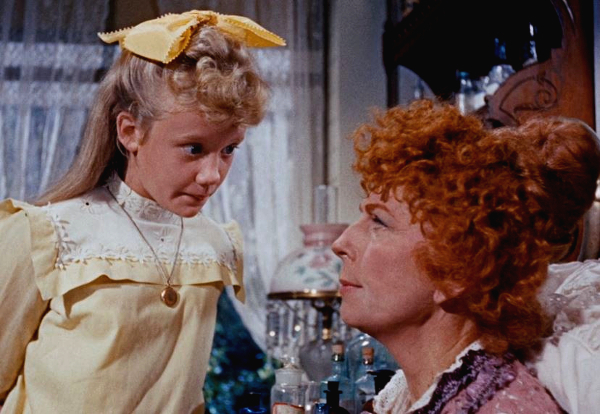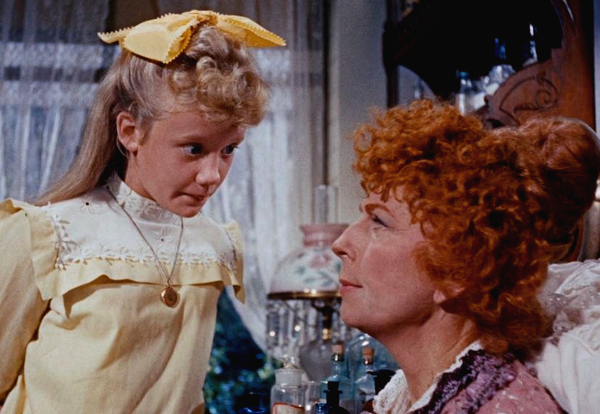“Bless you prison, bless you for being in my life. For there, lying upon the rotting prison straw, I came to realize that the object of life is not prosperity as we are made to believe, but the maturity of the human soul.”
Aleksandr Solzhenitsyn, The Gulag Archipelago
I recently re-watched Pollyanna (Disney, 1960)1 for the first time in many years. I know that this sunny young girl and her “glad game” – where you think of things to be glad about in every situation – had a profound impact on my life and attitude growing up.

The story, as presented, is charming: a cheerful young orphan comes to a town of selfish, prickly, and bitter people and transforms everyone by her witness of joy. But is that really what happens?
No. It isn’t.
Faith, hope, and love transform these characters, not the glad game.
At the start of the movie, Pollyanna, the daughter of missionaries, has just lost both her parents and goes to live with her rich aunt. Her minister father taught her the glad game after she asked for a doll for Christmas and in the missionary donation barrels she was only sent crutches – she could be glad that she didn’t need the crutches!
Armed with this glad game, she faces life without much money as the daughter of missionaries, then the death of both her parents, and a transition to a new country with a new guardian.
In my own life, I chose as my “life verse” and my motto, “Rejoice always … in everything give thanks, for this is the will of God for you in Christ Jesus” (1 Thess 5:16–18). I had “Rejoice always” as my screensaver at work, I signed my personal emails “Rejoice always,” I had “Rejoice always” embroidered on my lunch box. (It is perhaps telling that in my many quotations of this verse over the years, I often forgot the “pray without ceasing” that comes after “rejoice always.”)
Armed with my verse “Rejoice always,” I faced intense college-related stress, the death of my father, and moving to a new city where I knew almost no one.
Dr. Maria Montessori was an early 20th century Italian educator, physician, and scientist. Bringing her Catholic faith to her formation of educators, she said, “There are two sins, in particular, which tend to distort our true vision.… They are pride and anger. Hence, humility and patience – their opposites – are the virtues most needed.”
Humility is seeing ourselves as we really are, not how we imagine ourselves to be. In humility, we can accept correction and be open to change. Patience involves letting God work on God’s timeline, not on ours.
Any prideful “approach” to life, the kind that might come out of a self-help book, can be a shield against feeling difficult feelings. When we are faced with a shock, an “approach” can give us traction to escape (as quickly as possible) that shock and avoid fully facing that suffering. If our internal approach is judgment, when something bad happens to someone else we can tell ourselves, “I wouldn’t have made the choices they did, so it wouldn’t have happened to me,” if our approach is negativity, we can say, “I didn’t expect any better, so I’m not surprised,” if our approach is positivity, we can grasp at how the situation could be worse or what small part there is to be glad about.
These approaches may be our habits of many years, but if built on pride, all of them can lead to a lack of vulnerability, a lack of humility, and a lack of love. Anything built on pride or anger does not turn us towards God and our neighbor, but leads us to turn away from suffering.
Suffering comes to everyone. And as Christians we know that suffering can have a purpose. When we have the ability to look suffering in the face and feel it, when we have the ability to cry, we can cry out to God in a way that’s not possible with our prideful protective “armor” on.
A sampling of quotes from saints on suffering:
“When I shrink from suffering, Jesus reproves me and tells me that He did not refuse to suffer. Then I say ‘Jesus, Your will and not mine.’ At last I am convinced that only God can make me happy, and in Him I have placed all my hope.”
St. Gemma Galgani
“When it is all over you will not regret having suffered; rather you will regret having suffered so little, and suffered that little so badly.”
St. Sebastian Valfre
“Many would be willing to have afflictions provided that they not be inconvenienced by them.”
St. Francis de Sales
When the townsfolk in Pollyanna despair of standing up to her rich aunt, who basically owns the town, Pollyanna says, “She doesn’t own the church.” Faith transcends local politics and gossip. Faith in God, who loves us and is with us throughout our joys and struggles, changes our perspective.

Pollyanna meets grumpy and selfish people throughout the town and is relentlessly glad around them. Some of them find this endearing, some find it annoying.
“Oh, what pretty satin, are you having a dress made?” she says to the hypochondriac, “No, I’m choosin’ the lining for my coffin.”
In connecting people to each other and to purpose – introducing the reclusive old man to the orphan boy, giving the hypochondriac a useful way to serve others and rejoin the community – Pollyanna helps them break out of their selfish grooves and experience hope. Hope that the future can be different (and better!) than the past. This hope is not crushed by suffering, because this hope is rooted in faith and loving community, not in the frailty of one’s ability to “think positive!”
At the end of the movie (spoiler alert) Pollyanna falls from climbing a three-story-tall tree and becomes paralyzed.
Her grief about not being able to walk (possibly for the rest of her life) is too big to be swatted away with a cheerful thought. When her friends bring up the glad game, she says she doesn’t want to play.
It is then, when she feels real sorrow and grief, and lets down the protective shield of positivity, that she can accept and feel love in a new way. The townsfolk who come to see her before she leaves on the train to Boston for an operation that might help her walk again, do not come with cheerful platitudes or “it could be worse” messages. They come, mostly, with no words at all. Just their presence, their friendship, and their love are what give Pollyanna hope for the future. She is loved even when she is less able and capable than she once was, she is loved when she has no positive words to say, she is loved for herself, not the facets of personality that she thought were herself. Her positivity is revealed as a barrier she erected between herself and the world.
This story is my story. In my experience of depression, I couldn’t function. I wasn’t myself. I didn’t want anyone to see me sick like this. Normally, I pushed cheerfulness out into the world around me with forceful effort. When I went to a social gathering once during my season of depression (at a time when I did have the ability to get off the couch), I felt like my light had not just gone out, but like I had collapsed into a black hole, where no effort could bring light again.
There was a truth there that was hard to accept. With my own effort, I couldn’t fix myself.
I could be open to God’s work in me, in humility I could listen to advice from my doctor and my therapist and accept help from friends, but nothing I could do myself would make me better or would make me feel like myself again. The glad game was not only useless, it felt absurd.
It was difficult to pray during my depression, partly because it was difficult to think straight and partly because lifting my spirit towards God felt impossible under the crushing weight of darkness and emptiness.
When I couldn’t reach towards God, He came to me.
At my lowest point, on leave from work, lying on the couch and staring at the ceiling, I thought, What if I’m stuck like this forever? What if I can never work or be useful again? What if I can’t be my friendly, cheerful self anymore? What if I can’t care for my child? What if I need help to do everything from here on out?
And in that moment, I felt supernatural peace. If I was an invalid for the rest of my life, God could bring more grace into the world through me than if I was at the wheel. My friends had shown their steadfast love for me, even when I felt unlovable, even when there was no way I could pay them back. God loved me. Not for anything I could do or for any talent or personality feature, He loved me. I was loved as I was without needing to do anything. I accepted being undeservedly loved.
There was a “me” distinct from my learned personality features; that’s what God loved and that’s what He fixed.
I came to accept each moment of my depression as it arrived. It was still awful, I just wasn’t fighting and panicking any more. The suffering didn’t end, but the fear of suffering did. I let go. Even of myself – my personality, which I thought was myself. I let go of expectations and of timelines of getting better. I accepted (after very much fighting and struggling) what God wanted to give me in each moment. I was given hope.
Before this experience, I had thought that I was a finished product. Personality traits hardened like the clay of a completed vessel, features set, ready for use. And yet, I am not the potter.
“Yet, O Lord, thou art our Father; we are the clay, and thou art our potter; we are all the work of thy hand.”
Isaiah 64:8
“And the vessel he was making of clay was spoiled in the potter’s hand, and he reworked it into another vessel, as it seemed good to the potter to do.”
Jeremiah 18:4
God had a purpose for me that it was not possible for me to do in my current form. He had to rework me into another vessel. A vessel who could better love Him and my neighbor.
The devil says you can never change. God works to help you grow.
In therapy conversations, I constantly referenced books and movies to describe what I was experiencing. In Harry Potter, the dementors – cold dark, haunting figures who make you believe you’ll never be happy again – are one of the best depictions of depression I’ve encountered.
Another image in a Harry Potter book that felt extremely relevant to my experience was the Devil’s snare. Magical vines called Devil’s snare twist and trap a person. If one panics and thrashes the vines only get tighter, but sunlight vanquishes the vines completely. This was my experience of anxiety and depression. My struggling, fighting, and thrashing only trapped me more tightly in the suffocating darkness. The light of Jesus’ death and resurrection, the fact that God died for me, even knowing all the sins I’d ever commit, was so bright that it banished my fear. Even while still in depression, I had freedom from fear. From fear that I was alone. From fear that I had nothing to contribute and was worthless. From fear that if my friends really knew me they wouldn’t love me. From fear that I was unlovable. I was no longer in the grip of the Devil’s snare.
And after letting go of everything, eventually God gave me everything back and more.
“And the Lord gave Job twice as much as he had before.… And the Lord blessed the latter days of Job more than his beginning.”
Job 42:10, 12
The depression did leave me (thanks in part to many prayers of many friends, good therapy work, and medication; but mainly to the will of God). And I was given not just the ability to feel again, but an expanded emotional palette. I could feel sad without fighting it. I could feel empathy in a new way, without fear of catching the other person’s sadness. I didn’t have to “fix” people’s feelings when they weren’t happy, I could acknowledge their feelings and allow those feelings to be. I was transformed, a new creation. Parts of my personality that I had built myself, my baggage and coping mechanisms, had been burned away, but I had been saved.
As St. Paul says:
For no one can lay a foundation other than that which is laid, which is Jesus Christ. Now if anyone builds on the foundation with gold, silver, precious stones, wood, hay, straw– each one’s work will become manifest, for the Day will disclose it, because it will be revealed by fire, and the fire will test what sort of work each one has done. If the work that anyone has built on the foundation survives, he will receive a reward. If anyone’s work is burned up, he will suffer loss, though he himself will be saved, but only as through fire.
1 Corinthians 3:11–15
Faith, hope, and love – love from God and from my friends in Christ – sustained me in my darkest season.
I saw these virtues sustain Pollyanna in her darkest season.
And then as she leaves on the train, for an operation that might or might not restore her ability to walk, after being sustained by faith, hope, and love, her new friends put up a sign under the name of their town that says, “The Glad Town.” I think they missed the point.

